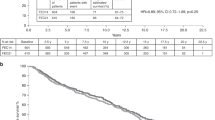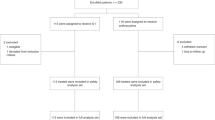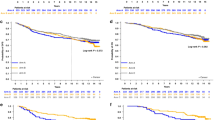Summary:
Data from eight randomised trials on high-dose chemotherapy (HDC) for metastatic breast cancer (MBC) have been published, but only seven studies are evaluable after the Bezwoda trial was discredited. Moreover, overall survival (OS) has been evaluated in only four out of seven studies since three had a crossover design. OS was similar for the HDC and standard-dose chemotherapy (SDC) group in the four evaluable trials, while disease-free survival (DFS) was improved in the HDC group in six of the seven trials. The delay in relapse for patients with metastatic disease represents an important clinical outcome; furthermore, since none of the reported studies randomised more than 220 patients, their statistical power may have been too limited to detect meaningful survival differences. Finally, preliminary experiences have shown that HDC seems to be the ideal platform upon which to build novel therapies. In conclusion, HDC remains an important field of clinical research for breast cancer patients with stage IV disease and, from the studies reported in this article, there is some evidence for offering this therapeutic modality to selected patients who are interested in a medically aggressive approach.
This is a preview of subscription content, access via your institution
Access options
Subscribe to this journal
Receive 12 print issues and online access
$259.00 per year
only $21.58 per issue
Buy this article
- Purchase on Springer Link
- Instant access to full article PDF
Prices may be subject to local taxes which are calculated during checkout
Similar content being viewed by others
References
Peters WP, Shpall EJ, Jones RB et al. High dose combination alkylating agents with bone marrow support as initial treatment for metastatic breast cancer. J Clin Oncol 1988; 6: 1368–1376.
Kennedy MJ, Beveridge RA, Rowley SD et al. High dose chemotherapy with reinfusion of purged autologous bone marrow following dose-intensive induction as initial therapy for metastatic breast cancer. J Nat Cancer Inst 1991; 83: 920–926.
Williams SF, Gilewski T, Mick R et al. High dose consolidation therapy with autologous stem-cell rescue in stage IV breast cancer: follow-up report. J Clin Oncol 1992; 10: 1743–1747.
Antman KH, Ayash L, Elias A et al. A phase II study of high dose cyclophosphamide, thiotepa and carboplatin with autologous bone marrow support in women with measurable advanced breast cancer responding to standard dose therapy. J Clin Oncol 1992; 10: 102–110.
Dunphy FR, Spitzer G, Fornoff JE et al. Factors predicting long-term survival for metastatic breast cancer patients treated with high dose chemotherapy and bone marrow support. Cancer 1994; 74: 125–134.
Perry J, Cruz J et al. High dose cyclophosphamide, thiotepa and carboplatin (CTCb) with autologous stem cell transplantation (ASCT) for poor prognosis breast cancer. Proc. ASCO 1994; 13 (Abstr. 175). p 93.
Ayash LJ, Wheeler C, Fairclough D . Prognostic factors for prolonged progression free survival with high dose chemotherapy with autologous stem cell support for advanced breast cancer. J Clin Oncol 1995; 13: 2043–2049.
Silverman M, Rybka W, Lembersky B et al. Sequential high dose cyclophosphamide, CTCb (cyclophosphamide, Thiotepa, Carboplatin) and standard dose adriamycin (ADR) in patients with untreated metastatic breast cancer patients (MBC). Proc ASCO 1995; 14: (Abstr. 252I) p 138.
Cameron DA, Craig J, Gabra H et al. High dose chemotherapy supported by peripheral blood progenitor cells in poor prognosis metastatic breast cancer. A phase I/II study. Br J Cancer 1996; 74: 2013–2017.
Gisselbrecht C, Extra JM, Lotz JP et al. Cyclophosphamide/mitoxantrone/melphalan (CMA) regimen prior to autologous bone marrow transplantation (ABMT) in metastatic breast cancer. Bone Marrow Transplant 1996; 18: 857–863.
Weaver CH, Schwartzberg LS, Greco FA et al. An intent to treat analysis of a multi-institution phase II trial of high dose chemotherapy (HDC) in patient with newly diagnosed stage IV breast cancer. Proc. ASCO 1996; 15: (Abstr. 989) p 341.
Bitran JD, Samuels B, Klein L et al. Tandem high-dose chemotherapy supported by hematopoietic progenitor cells yields prolonged survival in stage IV breast cancer. Bone Marrow Transplant 1996; 17: 157–162.
Ayash LJ, Elias A, Schawaertz G et al. Double dose intensive chemotherapy with autologous stem-cell support for metastatic breast cancer: no improvement in progression free survival by the sequence of high dose melphalan followed by cyclophosphamide, thiotepa and carboplatin. J Clin Oncol 1996; 14: 2984–2992.
Lelli G, Aieta M, D' Addetta C et al. Our experience with high dose chemotherapy (HDCT) and peripheral blood progenitor cell (PBPC) autograft in the treatment of metastatic breast cancer (MBC). Proceedings of 23rd annual meeting of the EBMT. Bone Marrow Transplant 1997; 19(Suppl. 1): (Abstr. P138) p. 535.
Antman KH, Rowlings PA, Vaughan WP et al. High dose chemotherapy with autologous hematopoietic stem-cell support for breast cancer in North America. J Clin Oncol 1997; 15: 1870–1879.
Bezwoda WR, Seymour L, Densey RO . High dose chemotherapy with hematopoietic rescue as primary treatment for metastatic breast cancer: a randomized trial. J Clin Oncol 1995; 13: 2483–2489.
Peters WP, Jones RB, Vredenburg J et al. A large, prospective, randomized trial of high-dose combination alkylating agent (CPB) with autologous cellular support (ABMS) as consolidation for patients with metastatic breast cancer achieving complete remission after intensive doxorubicin-based induction therapy (AFM). Proc ASCO 1996; 16: (Abstr. 149). Vol. 15, p. 121.
Madan B, Broadwater G, Rubin P et al. Improved survival with consolidation high-dose cyclophosphamide, cisplatin and carmustine (Hd-CPB) compared with observation in women with metastatic breast cancer (MBC) and only bone metastases treated with induction adriamycin, 5-fluorouracil and methotrexate. Proc ASCO 2000; 19: (Abstr. 184) p. 48a.
Stadtmauer EA, O'Neill A, Goldstein LJ et al. Phase III randomized trial of high dose chemotherapy (HDC) and stem cell support (SCT) shows no difference in overall survival or severe toxicity compared to maintenance chemotherapy with cyclophosphamide, methotrexate and 5-fluorouracil (CMF) for women with metastatic breast cancer who are responding to conventional induction chemotherapy: the Philadelphia Intergroup Study (PBT-1). Proc. ASCO 1999; 18: (Abstr. 161) p. 1a.
Lotz JP, Cure H, Janvier M et al. High dose chemotherapy (HD-CT) with hematopoietic stem cell transplantation (HSCT) for metastatic breast cancer (MBC): results of the French protocol PEGASE 04. Proc. ASCO 1999; 18: (Abstr. 161). p 43a.
Crump M, Gluck S, Steward D et al. A randomised trial of high dose chemotherapy (HDC) with autologous peripheral blood stem cell support (ASCT) compared to standard therapy in women with metastatic breast cancer: a National Cancer Institute of Canada (NCIC) clinical trials group study. Proc ASCO 2001; 20: (Abstr. 82). p 21a.
Biron P, Durand M, Roche H et al. High dose thiotepa (TTP), cyclophosphamide (CPM) and stem cell transplantation after 4 FEC 100 compared with 4 FEC alone allowed a better disease free survival but the same overall survival in first line chemotherapy for metastatic breast cancer. Results of the PEGASE 03 French Protocol. Proc ASCO 2002; 20: (Abstr. 167). p 42a.
Schmid P, Samonigg H, Nitsch T et al. Randomised trial of up front tandem high-dose chemotherapy (HD) compared to standard chemotherapy with doxorubicin and paclitaxel (AT) in metastatic breast cancer (MBC). Proc ASCO 2002; 20: (Abstr. 171). p 43a.
Weiss RB, Gill GG, Hudis CA . An on-site audit of the South African trial of high dose chemotherapy for metastatic breast cancer and associated publications. J Clin Oncol 2001; 19: 2771–2777.
Stadtmauer EA, O'Neill A, Goldstein LJ et al. Conventional-dose chemotherapy compared with high-dose chemotherapy plus autologous hematopoietic stem cell transplantation for metastatic breast cancer. Philadelphia Bone Marrow Transplant Group. N Engl J Med 2000; 15: 1069–1076.
Stadtmauer EA, O'Neill A, Goldstein LJ et al. Conventional-dose chemotherapy compared with high-dose chemotherapy (HDC) plus autologous stem-cell transplantation (SCT) for metastatic breast cancer: 5-year update of the ‘Philadelphia Trial’ (PBT-1). Proc ASCO 2002; 20: (Abstr. 169). p 43a.
Antman KH . A critique of the eleven randomised trials of high-dose chemotherapy for breast cancer. Eur J Cancer 2001; 37: 173–179.
Berry DA, Broadwater G, Klein JP et al. High-dose versus standard chemotherapy in metastatic breast cancer: comparison of cancer and leukemia group B trials with data from the autologous blood and marrow transplant registry. J Clin Oncol 2002; 20: 743–750.
Rizzieri DA, Vredenburgh JJ, Jones R et al. Prognostic and predictive factors for patients with metastatic breast cancer undergoing aggressive induction therapy followed by high dose chemotherapy with autologous stem cell support. J Clin Oncol 1999; 17: 3064–3074.
Rowlings PA, Williams SF, Antman KH et al. Factors correlated with progression free survival after high dose chemotherapy and hematopoietic stem cell transplantation for metastatic breast cancer. JAMA 1999; 282: 1335–1343.
Hensel M, Schneeweiss A, Sinn HP et al. Stem cell dose tumourbiologic parameters as prognostic markers for patients with metastatic breast cancer undergoing high dose chemotherapy with autologous blood stem cell support. Stem Cells 2002; 20: 32–40.
Harris LN, Liotcheva V, Broadwater G et al. Comparison of methods of measuring HER-2 in metastatic breast cancer patients treated with high dose chemotherapy. J Clin Oncol 2001; 19: 1698–1706.
Bewick M, Conlon M, Gerard S et al. HER-2 expression is a prognostic factor in patients with metastatic breast cancer treated with a combination of high dose cyclophosphamide, mitoxantrone, paclitaxel and autologous blood stem cell support. Bone Marrow Transplant 2001; 27: 847–853.
Nieto Y, Cagnoni PJ, Nawaz S et al. Evaluation of the predictive value of Her-2/neu overexpression and p53 mutations in high risk primary breast cancer patients treated with high dose chemotherapy and autologous stem cell transplantation. J Clin Oncol, 2000; 18: 2070–2080.
Elias AD, Ibrahim J, Richardson P et al. The impact of induction duration and the number of high-dose cycles on the long-term survival of women with metastatic breast cancer treated with high-dose chemotherapy with stem cell rescue: an analysis of sequential phase I/II trials from the Dana–Farber/Beth Israel STAMP program. Biol Blood Marrow Transplant 2002; 8: 198–205.
Preti RA, Lazarus HM, Winter J et al. Tumour cell depletion of peripheral blood progenitor cells using positive and positive/negative selection in metastatic breast cancer. Cytotherapy 2001; 3: 85–95.
Hempel D, Muller P, Oruzio D et al. Combination of high-dose chemotherapy and monoclonal antibody in breast-cancer patients: a pilot trial to monitor treatment effects on disseminated tumour cells. Cytotherapy 2000; 2: 287–296.
Cowan KH, Moscow JA, Huang H et al. Paclitaxel chemotherapy after autologous stem-cell transplantation and engraftment of hematopoietic cells transduced with a retrovirus containing the multidrug resistance complementary DNA (MDR1) in metastatic breast cancer patients. Clin Cancer Res 1999; 5: 1607–1609.
Reece DE, Foon KA, Battacharya-Chatterjee M et al. Interim analysis of the use of the anti-idiotype breast cancer vaccine 11D10 (TriAb) in conjunction with autologous stem cell transplantation in patients with metastatic breast cancer. Clin Breast Cancer 2001; 2: 52–58.
Nieto Y, Vredenburgh JJ, Shpall EJ et al. Pilot phase II study of concurrent administration of trastuzumab and high-dose chemotherapy (HDCT) in advanced HER2+ breast cancer. Proc. ASCO 2002; 20: (Abstr. 1663). p 416a.
Carella AM, Beltrami G, Lerma E et al. Combined use of autografting and non-myeloablative allografting for the treatment of haematological malignancies and metastatic breast cancer. Cancer Treat Res 2002; 110: 101–112.
Author information
Authors and Affiliations
Rights and permissions
About this article
Cite this article
Tartarone, A., Romano, G., Galasso, R. et al. Should we continue to study high-dose chemotherapy in metastatic breast cancer patients? A critical review of the published data. Bone Marrow Transplant 31, 525–530 (2003). https://doi.org/10.1038/sj.bmt.1703824
Published:
Issue Date:
DOI: https://doi.org/10.1038/sj.bmt.1703824
Keywords
This article is cited by
-
Pegase 03: a prospective randomized phase III trial of FEC with or without high-dose thiotepa, cyclophosphamide and autologous stem cell transplantation in first-line treatment of metastatic breast cancer
Bone Marrow Transplantation (2008)
-
Haematopoietic stem cell transplantation (HSCT) in Europe 2002. Changes in indication and impact of team density. A report of the EBMT activity survey
Bone Marrow Transplantation (2004)



